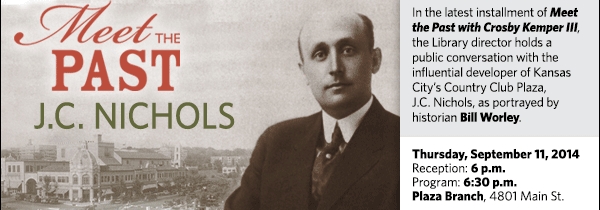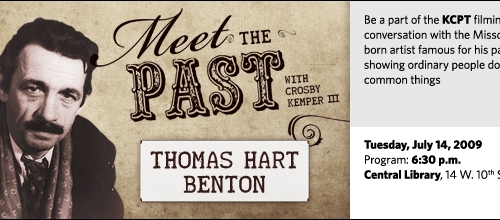All Library locations will be closed Monday, February 16 for Presidents Day.
From Kansas City’s signature Country Club Plaza to pristine shopping districts and neighborhoods across the country, J.C. Nichols’ imprint on the American landscape remains deep and far-reaching. The famed real estate developer, who died a little more than 64 years ago, is spotlighted in the latest installment of the Library’s popular Meet the Past series. Nichols — as portrayed by historian and Meet the Past veteran Bill Worley — will be interviewed by Library Director Crosby Kemper III. The program also includes introductory remarks about Nichols and the architectural legacy of the Country Club Plaza by Stephanie Meeks, president and chief executive officer of the National Trust for Historic Preservation, and Jonathan Kemper, president of the Library’s Board of Trustees and co-chair of the National Trust Council. The presentation will be taped by KCPT for later broadcast. Worley, who holds a Ph.D. in history from the University of Kansas, teaches history and geography at the Metropolitan Community Colleges’ Blue River campus. He is the author of J.C. Nichols and the Shaping of Kansas City: Innovation in Planned Residential Communities and The Plaza: First and Always. He has appeared in previous Meet the Past presentations as Walt Disney, James Naismith, and Tom Pendergast. Here, he takes on another role of historical heft. Nichols developed the Plaza on what once was swampland on the south edge of Kansas City, opening what was the nation’s first suburban shopping district in 1923. His emphasis on quality construction, beautiful landscaping, and consistency in planning became a template for cities nationwide. He also contributed to the social, cultural, and economic life of Kansas City. Nichols was a driving force behind the Liberty Memorial, the Nelson-Atkins Museum of Art, the Kansas City University (now the University of Missouri-Kansas City), and the Midwest Research Institute. His legacy as a developer is complicated by the deed restrictions that limited who could purchase property in a given neighborhood. The resulting racial discrimination — then legal and common throughout the nation — barred minorities from the Country Club District even had they been able to afford its expensive homes. A 6 p.m. reception precedes the program. Major funding for this episode of Meet the Past is provided by the W.T. Kemper Foundation – Commerce Bank, Trustee. The event is co-sponsored by Historic Kansas City.
Watch
This event is co-sponsored by: W.T. Kemper Foundation-Commerce Bank, Trustee; Historic Kansas City

